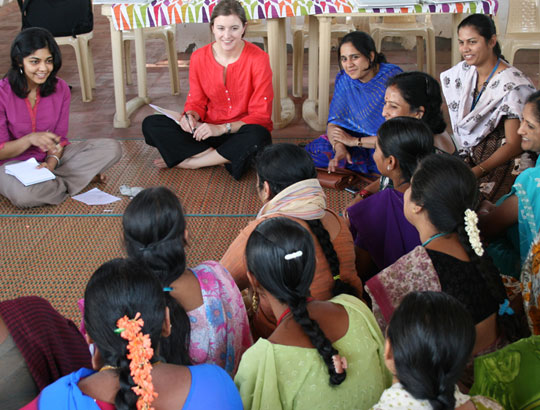Health enables returns.
One of those equations probably looks familiar to you. The other one should be equally apparent: how well do you work when you're coughing, sneezing, or, in the case of some factory workers in Bangladesh, substituting fabric scraps steeped in toxic dyes for menstrual pads? None of those situations is a recipe for productivity, which is why BSR (Business for Social Responsibility) launched HERproject, or Health Enables Returns. I wrote about this initiative for Women in the World Foundation last week:
At four Primark garment factories in Dhaka, Bangladesh, the fabric scraps that lay on the cutting room floor were often repurposed on the sly. Female workers snatched them up and used them as improvised sanitary napkins, subsequently developing infections from the strong, toxic dyes and dirt present on the fabric. In addition to the pain and suffering they experienced, they were missing work. It was a phenomenon Racheal Yeager had seen throughout Asia.
Last year, Yeager, 29, arrived in Dhaka with a solution: HERproject, a yearlong factory-based health education program that works in partnership with local non-profit and medical service organizations, trains women to become peer educators and spread valuable information about basic hygiene and reproductive health care. The project, an initiative created by BSR, launched in 2007. It has so far reached approximately 100,000 women in more than 80 factories in eight countries in Asia and the Middle East HERproject counts as its participants some of the biggest names in the apparel and electronics industries, including Levi Strauss, Abercrombie and Fitch, J. Crew and HP, all of whom have a vested interest in ensuring their factories comply with international standards.
While there is no precise data available, women are thought to make up 60% to 80% of factory workers globally, a figure that can go even higher, depending on the country. Although most of the factories have clinics on-site, workers often arrive from rural villages, with little, if any, knowledge about preventing sickness, sexually transmitted diseases, or unwanted pregnancy. For these women, the biggest barrier to robust health is a lack of information. But with a demanding work schedule and little time off for school or doctor’s visits, there’s little opportunity for them to seek that information independently. HERproject brings it to the factory floor.
Read the full story, "Meeting Women Where They Are: Health Education on the Factory Floor," here.
